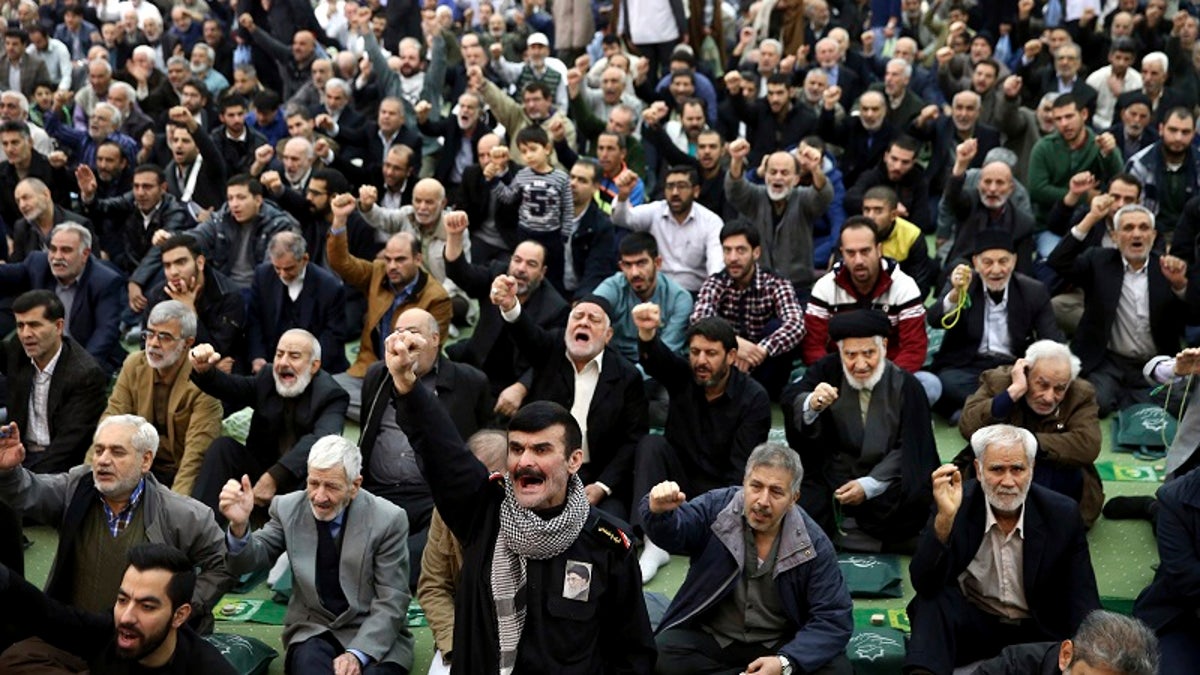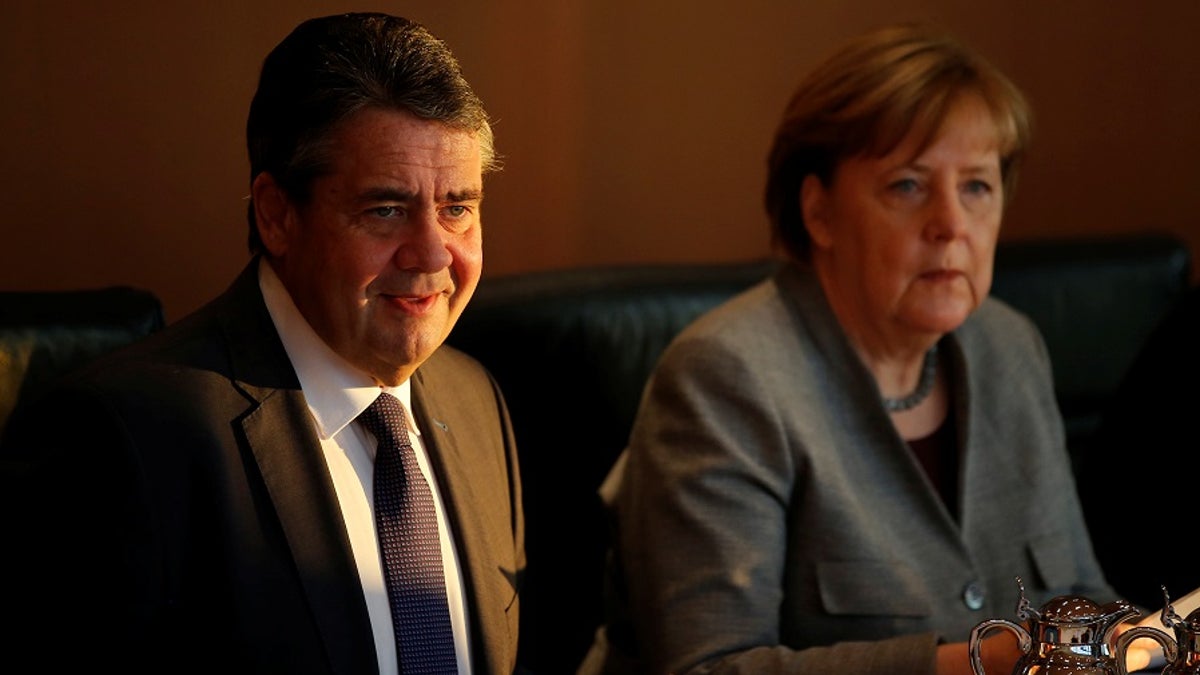
The German government is being urged to abandon its support of Iran’s mullah regimes as Iranians protest against the regime. (AP)
While tens of thousands of Iranians have taken to the streets in protest, the German government is taking heat for what some are calling its pro-regime policy in Iran, and its decision to allow sanctuary and medical treatment for an alleged mass murderer from the Islamic Republic.
“The nationwide protests against the Islamist mullah regime in Iran make it obvious that the federal government’s Iran policy has reached a dead end,” said a statement from Ulrike Becker, a spokesperson for the German-based STOP THE BOMB campaign. “For decades, Germany’s Iran policy has supported an Islamist dictatorship that today can only be upheld with utmost violence against its own people.
“We demand an end of the collaboration with a terror-spreading regime which is rejected internally and externally, by the people of Iran and by Iran's neighbors. We expect clear political support of the demands for freedom and democracy in Iran.”
German Foreign Minister Sigmar Gabriel, a zealous supporter of the controversial 2015 Iran nuclear deal, waited days before wading gingerly into the issue of the mass demonstrations. “We appeal to the Iranian government to respect the rights of the demonstrators to assemble and to peacefully raise their voices,” he said, adding, “After the confrontations of recent days, it is all the more important that all sides refrain from violent actions.”

German Foreign Minister Sigmar Gabriel (left) is a supporter of the Iranian nuclear deal. German Chancellor Angela Merkel (right) confirmed Germany is one of Iran's most important trade partners. (Reuters)
Gabriel, considered one of the most pro-Iranian figures within the 28-member European Union, led a large business delegation to Tehran just days after the Joint Comprehensive Plan of Action – the formal name for the nuclear deal – was reached. A year later, he traveled with a second group of company representatives to promote German trade.
In 2017, Gabriel hosted Hamidreza Torabi,who heads the Islamic Academy of Germany – part of the Iranian regime-owned Islamic Center of Hamburg – and who has called for the destruction of the Jewish state.
German-Iranian relations span many fields, and have raised questions about Chancellor Angela Merkel’s commitment to combating Islamic extremism and promoting democracy. A spokesman for Merkel confirmed on Wednesday that “Germany is still one of the most important trade partners of Iran." Exports to Iran in 2016, the most recent year for data, totaled more than three billion dollars.
The mass circulation Bild newspaper reported in December that the German government also provides about $400,000 to a pro-Iranian regime umbrella organization as part of a program to counter extremism. The money for the Shi’ite communities of Germany (IGS) is designed to promote “deradicalization” and “prevent extremism.”
But a 2016 Hamburg intelligence agency report, which monitors threats to Germany’s democracy, includes a reference to the IGS and a number of its members' organizations, including the Islamic Center of Hamburg. The German government classifies the Shi’ite umbrella group as “influenced by extremism.”
Fathiyeh Naghibzadeh, a founding member of STOP THE BOMB, on Jan. 1 called on Merkel and Gabriel to “take a clear stance against the dictatorship in Iran, and support the freedom-loving people. Silence or even support of the mullahs will isolate Germany and Europe in the region and worldwide.”
The dissident added, “In 2009, the West abandoned millions of Iranian people who demonstrated for months against the fundamentalist dictatorship. It has been claimed that only the middle class has demonstrated, while poor people still supported the Islamist system. Now the uprising has started in the provinces, and the slogans of the poor against the fundamentalists are even more radical.”
In response to Fox News questions about Germany's alleged pro-Iran regime foreign policy, a spokesman for the Merkel administration cited a Jan. 3 briefing that the government said it is closely "watching what is happening on the ground" in Iran because the "situation remains unclear."
The spokesman at the briefing added that an "improvement in the human rights situation is an important concern." The Merkel administration acknowledged human rights have not improved under the tenure of Iranian President Hassan Rouhani.
In addition to trade, Germany’s intelligence community has ties with counterparts in Iran. In 2016, Klaus-Dieter Fritsche, a German state secretary responsible for intelligence, met with Iran's top spy and cleric, Mahmoud Alavi.
Meanwhile, in the German state of Lower Saxony, the medical treatment of Ayatollah Mahmoud Hashemi Shahroudi, the former head (1999-2009) of Iran’s infamous justice ministry, has stirred controversy, and prompted referral to the public prosecutor after a public letter calling for him to be “charged and condemned for his crimes against humanity.” The case is currently being investigated.
It was under Shahroudi’s watch as justice minister that adolescents were executed, political and human rights activists were arbitrarily arrested, prisoners were tortured and reform newspapers were closed. Shahroudi is a loyal follower of Supreme Leader Ayatollah Ali Khamenei, and is regarded by some as a possible successor. He was also a student of Khamenei’s predecessor, Ayatollah Ruhollah Khomeini, the founder of the Islamic Republic of Iran.
Volker Beck, a Middle East expert and former Green Party lawmaker, tweeted to his nearly 90,000 followers, “A mass murderer enjoys German medicine and humanitarian protection?”
Queries to Dr. Madjid Samii, the president of the International Neuroscience Institute in Hannover, where Shahroudi is being treated, were not immediately returned. Samii traveled with the German foreign minister to Iran, as part of his 2015 business delegation.








































